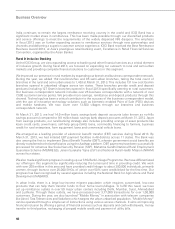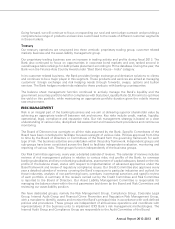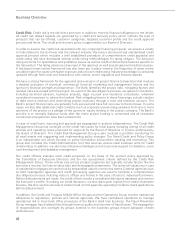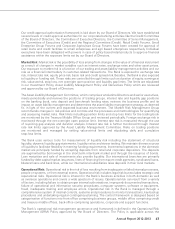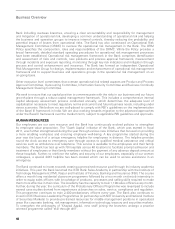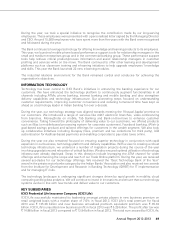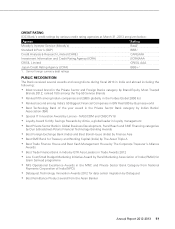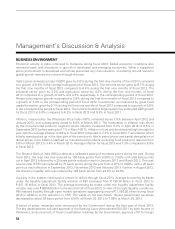ICICI Bank 2013 Annual Report Download - page 50
Download and view the complete annual report
Please find page 50 of the 2013 ICICI Bank annual report below. You can navigate through the pages in the report by either clicking on the pages listed below, or by using the keyword search tool below to find specific information within the annual report.
48
Business Overview
Bank including overseas branches, ensuring a clear accountability and responsibility for management
and mitigation of operational risk, developing a common understanding of operational risk and helping
the business and operation groups to improve internal controls, thereby reducing the probability and
potential impact of losses from operational risks. The Bank has also constituted an Operational Risk
Management Committee (ORMC) to oversee the operational risk management in the Bank. The ORM
Policy specifies the composition, roles and responsibilities of the ORMC. While the Policy provides a
broad framework, detailed standard operating procedures for operational risk management processes
have been established. Operational risk management framework in the Bank comprises identification
and assessment of risks and controls, new products and process approval framework, measurement
through incidents and exposure reporting, monitoring through key risk indicators and mitigation through
process and control enhancement and insurance. The Bank has formed an independent Operational
Risk Management Group for design, implementation and enhancement of operational risk management
framework and to support business and operations groups in the operational risk management on an
on-going basis.
Other executive level committees that oversee operational risk related aspects are Product and Process
Approval Committee, Outsourcing Committee, Information Security Committee and Business Continuity
Management Steering Committee.
We seek to ensure that our capital position is commensurate with the risks in our business and our future
growth plans through a robust capital management framework. This includes a comprehensive internal
capital adequacy assessment process conducted annually, which determines the adequate level of
capitalisation necessary to meet regulatory norms and current and future business needs, including under
stress scenarios. We believe we are well-placed to comply with RBI’s guidelines on the implementation
of the Basel III framework in India. We are also working towards migration to the advanced approaches
under the Basel II framework over the medium term, subject to applicable RBI guidelines and approvals.
HUMAN RESOURCES
Our employees are our core resource and the Bank has continuously evolved policies to strengthen
its employee value proposition. The “Saath Aapka” initiative of the Bank, which was started in fiscal
2011, was further strengthened during the year through various new initiatives that focused on providing
a more enabling workplace and ensuring employee well-being. A key programme started during the
year was the launch of a unique emergency helpline for employees in distress. The helpline provides
round the clock access to emergency care through access to qualified medical assistance and critical
services such as ambulance over telephone. This service is available to the employees and their family
members. The Bank has tied up with 70 hospitals across 40 locations to facilitate prompt admission and
treatment of employees or their family members without the payment of any advance deposit amount at
these hospitals. Further, to reinforce the safety and security of our employees, especially of our women
colleagues, a special 24X7 helpline has been created which can be used to access assistance in an
emergency.
The Bank continued to invest towards creating a pre-trained resource pool through its industry academia
initiatives. This year the Bank launched the ICICI Bank Sales Academy in partnership with the Institute of
Technology Management (ITM), Raipur and Institute of Finance, Banking and Insurance (IFBI). The course
offers a month long residential classroom programme followed by a two month on-the-job internship in
order to equip sales officers with knowledge of products, processes and selling skills required to make
them more effective in their roles. The Academy has the capacity to train 1,100 sales officers every month.
Further, during the year, the curriculum of the Probationary Officers Programme was revamped to include
several case studies derived from experiences at branches on sales, service, compliance and regulation.
This programme continues to train 2,400 probationary officers every year. The Bank also continues to
invest in ICICI Business Leadership Programmes (in partnership with NIIT University and National Institute
of Securities Markets) to provide pre-trained resources for middle management positions in specialized
areas like corporate banking, risk management, information technology, treasury and securities markets.
To strengthen the philosophy of ‘Khayaal Aapka’, new staff joining the branches undergo a practice
oriented programme called “skill through drill”.








